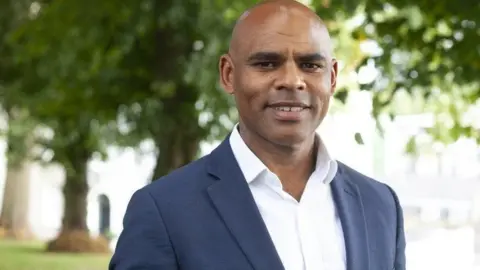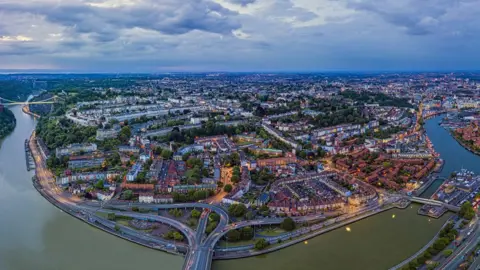Bristol mayor Marvin Rees responds to press conference row
 Bristol City Council
Bristol City CouncilThe mayor of Bristol has denied banning local democracy reporters (LDRs) from attending his formal mayoral briefings.
It follows a clip from a recent press conference which showed reporter Alex Seabrook, asking Marvin Rees if "he saw the irony" in flying to Vancouver to deliver a talk on climate change.
His office then declined to invite LDRs to further briefings, sparking a wider boycott from Bristol's journalists.
"There's no ban but they're not invited," said Mr Rees.
According to the Local Democracy Reporting Service, he was asked if he would reverse the ban on LDRs attending his fortnightly press conferences, during a council meeting on Tuesday.
He denied that there was ever a ban.
'Nobody's been banned'
"The whole fortnightly press conferences were set up by me. There had never been a practice like that in the council of setting up press conferences on a regular basis to give the city's journalists easy access," said Mr Rees.
"Nobody's been banned. I didn't invite you to my birthday party, but I didn't ban you from it.
"It's up to me. It's not statutory, I'm not required to do it, we do it to give journalists easy access to me to ask whatever they want, and we can invite whoever we want."
 Getty Images
Getty ImagesThe LDRS is funded by the BBC to provide public service reporting on local authorities. The reporters on the service are based with local newspapers.
The decision to exclude LDRs from the fortnightly briefings has led to a boycott of the meetings by other local media - including the BBC, BristolLive and BristolWorld.
In the meeting, Mr Rees went on to criticise Reach, the company which owns the Bristol Post and Bristol Live, and employs the city's two LDRs.
"The local democracy reporters are publicly funded. A private corporation doesn't employ enough people, and so subsidises its staff with publicly-funded journalists, which is why the National Union of Journalists (NUJ) was opposed to it in the first instance," he said.
"We don't think that's appropriate. Every news organisation in the city should properly staff itself at its own cost, not out of the public purse."
"Nobody is banned—but they're not invited. I can invite anyone to interview me I want, that doesn't mean I need to invite everyone."
'Shines a light'
After the meeting, editor at Bristol Live Pete Gavan said the LDRS has been a "huge success" since it was launched in 2017.
"It helps us and partners shine a light on what's happening across the city," said Mr Gavan.
"Covering the mayor is entirely within the remit, and we hope to find a resolution that sees the LDRs welcome again."
The NUJ is also supporting the stance of local media in boycotting any future briefings.

Follow BBC West on Facebook, Twitter and Instagram. Send your story ideas to: [email protected]
